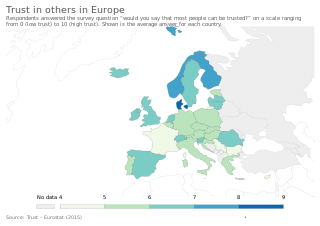An incest taboo is any cultural rule or norm that prohibits sexual relations between certain members of the same family, mainly between individuals related by blood. All human cultures have norms that exclude certain close relatives from those considered suitable or permissible sexual or marriage partners, making such relationships taboo. However, different norms exist among cultures as to which blood relations are permissible as sexual partners and which are not. Sexual relations between related persons which are subject to the taboo are called incestuous relationships.

The Westermarck effect, also known as reverse sexual imprinting, is a psychological hypothesis that states that people tend not to be attracted to peers with whom they lived like siblings before age six. This hypothesis was first proposed by Finnish anthropologist Edvard Westermarck in his book The History of Human Marriage (1891) as one explanation for the incest taboo.
In psychology and ethology, imprinting is any kind of phase-sensitive learning that is rapid and apparently independent of the consequences of behaviour. It was first used to describe situations in which an animal or person learns the characteristics of some stimulus, which is therefore said to be "imprinted" onto the subject. Imprinting is hypothesized to have a critical period.

Sexual attraction is attraction on the basis of sexual desire or the quality of arousing such interest. Sexual attractiveness or sex appeal is an individual's ability to attract other people sexually, and is a factor in sexual selection or mate choice. The attraction can be to the physical or other qualities or traits of a person, or to such qualities in the context where they appear. The attraction may be to a person's aesthetics, movements, voice, or smell, among other things. The attraction may be enhanced by a person's adornments, clothing, perfume or style. It can be influenced by individual genetic, psychological, or cultural factors, or to other, more amorphous qualities. Sexual attraction is also a response to another person that depends on a combination of the person possessing the traits and on the criteria of the person who is attracted.
In published academic research, publication bias occurs when the outcome of an experiment or research study biases the decision to publish or otherwise distribute it. Publishing only results that show a significant finding disturbs the balance of findings in favor of positive results. The study of publication bias is an important topic in metascience.

Trust is the willingness of one party to become vulnerable to another party on the presumption that the trustee will act in ways that benefit the trustor. In addition, the trustor does not have control over the actions of the trustee. Scholars distinguish between generalized trust, which is the extension of trust to a relatively large circle of unfamiliar others, and particularized trust, which is contingent on a specific situation or a specific relationship.
In medical research, social science, and biology, a cross-sectional study is a type of observational study that analyzes data from a population, or a representative subset, at a specific point in time—that is, cross-sectional data.
Sexual capital or erotic capital is the social power an individual or group accrues as a result of their sexual attractiveness and social charm. It enables social mobility independent of class origin because sexual capital is convertible, and may be useful in acquiring other forms of capital, including social capital and economic capital.
Matching is a statistical technique which is used to evaluate the effect of a treatment by comparing the treated and the non-treated units in an observational study or quasi-experiment. The goal of matching is to reduce bias for the estimated treatment effect in an observational-data study, by finding, for every treated unit, one non-treated unit(s) with similar observable characteristics against which the covariates are balanced out. By matching treated units to similar non-treated units, matching enables a comparison of outcomes among treated and non-treated units to estimate the effect of the treatment reducing bias due to confounding. Propensity score matching, an early matching technique, was developed as part of the Rubin causal model, but has been shown to increase model dependence, bias, inefficiency, and power and is no longer recommended compared to other matching methods. A simple, easy-to-understand, and statistically powerful method of matching known as Coarsened Exact Matching or CEM.

Iatrogenesis is the causation of a disease, a harmful complication, or other ill effect by any medical activity, including diagnosis, intervention, error, or negligence. First used in this sense in 1924, the term was introduced to sociology in 1976 by Ivan Illich, alleging that industrialized societies impair quality of life by overmedicalizing life. Iatrogenesis may thus include mental suffering via medical beliefs or a practitioner's statements. Some iatrogenic events are obvious, like amputation of the wrong limb, whereas others, like drug interactions, can evade recognition. In a 2013 estimate, about 20 million negative effects from treatment had occurred globally. In 2013, an estimated 142,000 persons died from adverse effects of medical treatment, up from an estimated 94,000 in 1990.
Scholarly studies have investigated the effects of religion on health. The World Health Organization (WHO) discerns four dimensions of health, namely physical, social, mental, and spiritual health. Having a religious belief may have both positive and negative impacts on health and morbidity.
The Wonder Weeks is the English translation of the Dutch book Oei, ik groei! by physical anthropologist Hetty van de Rijt and ethologist and developmental psychologist Frans Plooij. Originally published in 1992, it has been republished several times, with an updated 6th edition published in 2019. Drawing on many years of observation and analysis of infant development, it gives parents practical guidance to help their baby's cognitive development through its predictable stages or 'leaps'. Its theoretical basis is Perceptual Control Theory, which predicts and explains the observed phenomena. Questioning of the research with mother-infant dyads has received some attention in the press and social media, though sometimes reducing it to a matter of sleep schedules. The research has been replicated several times, and Brazelton found it to be mutually confirmatory with his own work. The book continues to be popular, and the publisher has produced a mobile app based on the book.

Shelly Grabe is a professor in Social Psychology at the University of California Santa Cruz, where she has affiliations with Feminist Studies and Latin American and Latino Studies. Her research involves women's human rights and globalization and the international attention given to women's empowerment.
The weathering hypothesis was proposed to account for early health deterioration as a result of cumulative exposure to experiences of social, economic and political adversity. It is well documented that minority groups and marginalized communities suffer from poorer health outcomes. This may be due to a multitude of stressors including prejudice, social alienation, institutional bias, political oppression, economic exclusion and racial discrimination. The weathering hypothesis proposes that the cumulative burden of these stressors as individuals age is "weathering," and the increased weathering experienced by minority groups compared to others can account for differences in health outcomes. In recent years, the biological plausibility of the weathering hypothesis has been investigated in studies evaluating the physiological effects of social, environmental and political stressors among marginalized communities. This has led to more widespread use of the weathering hypothesis as a framework for explaining health disparities on the basis of differential exposure to racially based stressors. Researchers have also identified patterns connecting weathering to biological phenomena associated with stress and aging, such as allostatic load, epigenetics, telomere shortening, and accelerated brain aging.

The male infertility crisis is an increase in male infertility since the mid-1970s. The issue attracted media attention after a 2017 meta-analysis found that sperm counts had declined by 52.4 percent between 1973 and 2011. The decline is particularly prevalent in Western countries such as New Zealand and Australia, Europe and North America. A 2022 meta-analysis reported that this decline extends to non-Western countries, namely those in Asia, Africa, Central America, and South America. This meta-analysis also suggests that the decline in sperm counts may be accelerating.
The first case of HIV in a woman was recorded in 1981. Since then, numerous women have been infected with the HIV/AIDS virus. The majority of HIV/AIDS cases in women are directly influenced by high-risk sexual activities, injectional drug use, the spread of medical misinformation, and the lack of adequate reproductive health resources in the United States. Women of color, LGBTQ women, homeless women, women in the sex trade, and women intravenous drug users are at an extremely high-risk for contracting the HIV/AIDS virus. In an article published by the Annual Review of Sociology, Celeste Watkins Hayes, an American sociologist, scholar, and professor wrote, "Women are more likely to be forced into survival-focused behaviors such as transactional sex for money, housing, protection, employment, and other basic needs; power-imbalanced relationships with older men; and other partnerings in which they cannot dictate the terms of condom use, monogamy, or HIV." The largest motivator to become part of the sex trade was addiction, the second largest being basic needs, and the third was to support their children/family.
Arnout van de Rijt is a Dutch sociologist. He studied music at the Utrecht School of the Arts and sociology at Utrecht University. He received his Ph.D. in Sociology from Cornell University in 2007 and worked until 2016 as Assistant and Associate Professor of Sociology at Stony Brook University. Since 2016 he has worked as Professor of Sociology at Utrecht University. In 2018 he was elected member of the European Academy of Sociology. He joined the Department of Political and Social Sciences at the European University Institute (EUI) in September of 2019. He has served as president of the International Network of Analytical Sociology since 2021. He is co-editor-in-chief of the journal Sociological Science.

Jeremy David Kark was a South African-born Israeli epidemiologist. He was a Professor of epidemiology at the Hebrew University – Hadassah School of Public Health and Community Medicine in Jerusalem and an adjunct at Stanford University Center for Health Policy Research.

The sociology of death explores and examines the relationships between society and death.
The psychological impact of discrimination on health refers to the cognitive pathways through which discrimination impacts mental and physical health in members of marginalized, subordinate, and low-status groups. Research on the relation between discrimination and health became a topic of interest in the 1990s, when researchers proposed that persisting racial/ethnic disparities in health outcomes could potentially be explained by racial/ethnic differences in experiences with discrimination. Although the bulk of the research tend to focus on the interactions between interpersonal discrimination and health, researchers studying discrimination and health in the United States have proposed that institutional discrimination and cultural racism also give rise to conditions that contribute to persisting racial and economic health disparities.







